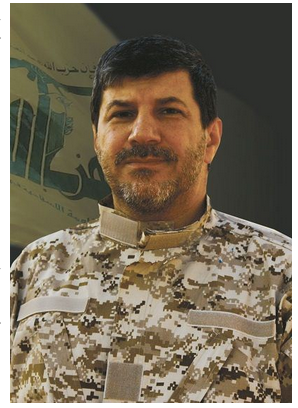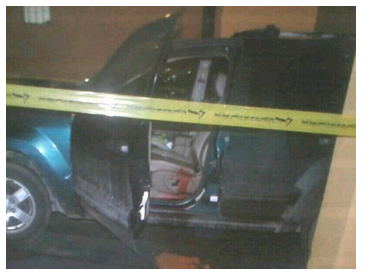Regional realignment with Hezbollah, Assad & Iran?
Hassan Laqqis, assassination scene. Source: Al Manar
There’s been lots of talk about the regional consequences of the Iran nuclear deal, and of a realignment as the West realizes that it might prefer Assad in power to a jihadi-dominated rebel government or some version of the current punishing settlement. Ryan Crocker told The New York Times that the US should resume cooperating with Damascus against Salafi jihadis, and various analysts and diplomats have been speculating that Iran, Assad, Hezbollah, and the US share plenty of common interests. Saudi Arabia and Israel stand to lose if the US begins to behave like a mature superpower, collaborating where it sees fit rather than holding itself hostage to the agenda of small allies behave as peers rather than clients.
The latest trigger was yesterday’s assassination of a Hezbollah official in Beirut. (Hassan Lakkis, according to Hezbollah’s Al-Manar Television, played an important role in the fight against Israel; Reuters reports that Lakkis was fighting recently in Syria.) That killing once again raised the question of Hezbollah’s broader direction. Has it provoked a maelstrom of jihadi attacks, retaliation for Hezbollah’s role in the Syrian civil war? Or is the conflict in Syria playing out in the interests of Hezbollah, Assad and Iran?
I think there’s some evidence that three years after a non-violent popular revolt against Assad’s nasty dictatorship, Assad has finally managed the shape the conflict he wanted. He wiped out the non-violent resistance, the intellectuals and the pluralists, and continues to mass his firepower against the FSA rather than the jihadists. As a result, the conflict pits an authoritarian but non-sectarian dictatorship against a Sunni rebellion dominated by takfiri jihadists. Hezbollah entered the war supposedly to fight the sectarian jihadis over there before they made it over here, a la George W Bush. It sounded facile then, but now it sounds true; each time there’s a bomb of assassination in Lebanon, it adds credence to Hezbollah’s claim that it’s on the side of a Middle Eastern order that tolerates multiple faiths and power-sharing, while on the other side Saudi and other Gulf money is supporting extremists who want to recreate the 7th Century Caliphate. Self-serving, but perhaps, true.
We’ve seen hints of change:
- An increase tempo of back-and-forth attacks in Lebanon.
- Stronger desire by Lebanese national institutions to contain the crisis.
- Reports that the US has shared intelligence with Lebanon in order to protect Hezbollah from attacks.
- A real push – in Track 2 and perhaps Track 1 diplomacy – to make the January talks in Geneva really amount to a negotiation for a settlement in Syria.
- The Iranian nuclear deal, which could calm anxieties about the regional Iran-Saudi cold/hot war, and allow for some tit-for-tat that could reduce global interest in the Syrian theater.
What should we look for as signals of a coming, substantive change?
- Rhetoric from Hassan Nasrallah that opens the door to a frigid détente with the US on some issues.
- Continuing restraint by Hezbollah in its response to attacks and assassinations.
- Agreements or accords that result from the vigorous outreach by Iran’s foreign minister to the leaders of the Arab countries in the Gulf.
- Offers, even totally rhetorical ones, from Assad to cooperate with the US against the jihadi groups in Syria.
The interim Iranian nuclear agreement could easily collapse (Marc Lynch writes here about the enormous potential but also the need to remember that it could all come to naught), but it’s a major opening. Iran has always been a more natural geopolitical ally for the US than the tiny oil-rich monarchies of the Arabian peninsula. It’s hard to imagine a full realignment without an internal shift in the governance of Iran, but perhaps, that could occur with a political shift short of regime change. The most likely outcome is incremental, with Iran and the US finding more avenues of cooperation but stopping short of an open embrace. But even the prospect of a cooling in the US relationship with absolute monarchs of the Gulf and the hawkish establishment of Israel, in favor of a more pragmatic policy that leaves room to cooperate with all the region’s heavyweights, has prompted a panic in Riyadh and Israel. That anxiety suggests it’s a very real prospect, and one that in the long-term would serve to cool down the region.




http://foreignpolicyblogs.com/2013/12/02/musings-on-iran-syria-and-deals/
This is a good analysis of what is happening in the ground. Assad has proven to be as shrewd as his father. The US needs to understand that its interests are best served through the full recovery of Iran as an ally rather than an enemy.